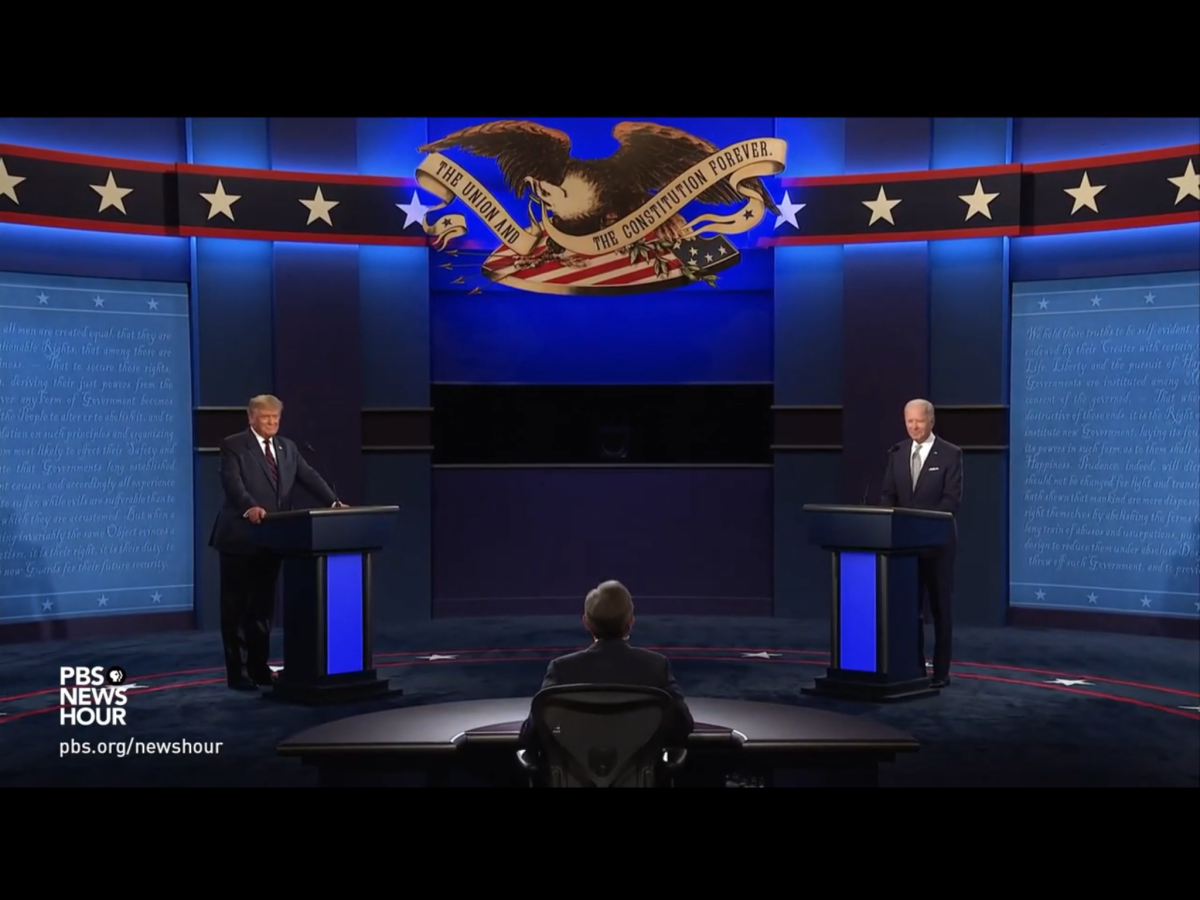I heard a myriad of reactions to last week’s presidential debate. Some of my friends thought it was comedy gold, while political commentators like Jake Tapper characterized the debate as a “hot mess inside a dumpster fire, inside a train wreck.” I was watching the chaos unfold through cracks in my fingers — not unlike how I watch horror films. Some undecided voters weren’t able to make a decision because there was a lack of substantive discourse. Fortunately, through the constant interruptions, name-calling and incoherent ranting, we can make some conclusions.
Although the candidates did not extensively discuss policy, Joe Biden revealed his main strategy would be attacking Donald Trump on his COVID-19 policies. Biden was at his best when pressing Trump on responding to the pandemic. He pointed to the 200,000 dead Americans, seven million who contracted the virus and the 40,000 infected daily. Biden further accused Trump of knowing the virus’ severity yet doing nothing in response to avoid panicking the American people. Later in the debate, Biden also attacked Trump’s economic response for COVID-19, blaming him for small businesses closing.
Trump naturally disputed all of Biden’s arguments, defending his administration’s work with reopening America’s economy. However, almost 53 percent of Americans are “very worried” about the economy and only 35 percent of independents approve of Trump’s COVID-19 policies. Therefore, while the president claims he has “done a great job as a president,” one of the most significant voting bases disagrees. Democrats and Republicans have low and high approval ratings respectively for Trump’s COVID-19 response as one would anticipate. However, winning an election requires a candidate to sway a significant amount of independent voters.
As of 2019, Gallup Polls found 42 percent of Americans identify as independent voters. If Biden continues to hammer Trump on his pandemic response, he may have a higher chance of winning independents. With less than a month until the election, Trump will have to pivot his rhetoric to win more independent votes.
In addition to COVID-19, race and law enforcement were also significant issues the two candidates discussed. The night’s most infamous moment was when Trump was asked to condemn white supremacists and told the Proud Boys to “stand back and stand by.” Commentators on both sides of the aisle have criticized Trump for refusing to outright condemn these organizations. “Fox & Friends” host Brian Kilmeade went as far as to say Trump “ruined the biggest layup in the history of debates.”
Fox News rarely criticizes Trump, and this moment in the debate may have hurt his chances with people of color and independent voters. In Florida, a battleground state, Biden leads Trump with Latino voters 58 percent to 34 percent. Furthermore, Trump’s Proud Boys comment sparked outrage among many Black voters in the state.
An FBI report indicates white supremacists are the “most persistent and lethal threat in the homeland,” contradicting Trump’s statement that most of the terrorism he sees is “from the left wing, not the right wing.”
On wider issues revolving around law enforcement, Trump accused Biden of being a puppet of the radical left and refusing to support law and order. The problem is that Joe Biden doesn’t support defunding the police and has stated “violence is never appropriate.” Furthermore, Monmouth University found Biden leads Trump 45 percent to 41 percent on maintaining law and order. Additionally, 61 percent of Americans think Trump has exacerbated protesters’ anger. If Trump wants to win the election, he needs to pivot away from accusing Biden as being one of the “radical left’s” lackeys.
Because the American people generally trust Biden more to ameliorate COVID-19’s effects and restore law and order, the debate indicates he needs to maintain course to win the election. If anything, last week’s debate helped Biden shape the election into a referendum on Trump’s COVID-19 response. Therefore, Trump should adjust his responses in the next two debates to discuss what his administration plans to do in the future to win over more independents.
Hopefully, the next few debates will be more policy focused and have fewer interruptions with the new debate rules. However, if the second presidential debate devolves into two old men shouting at each other, the race’s current dynamic will persist since Trump’s campaign will be unable to pivot in a new direction.
Caleb Powell is a sophomore biomedical engineering major and columnist for The Battalion. His column is typically published online every other Wednesday when not in the Thursday newspaper.
















